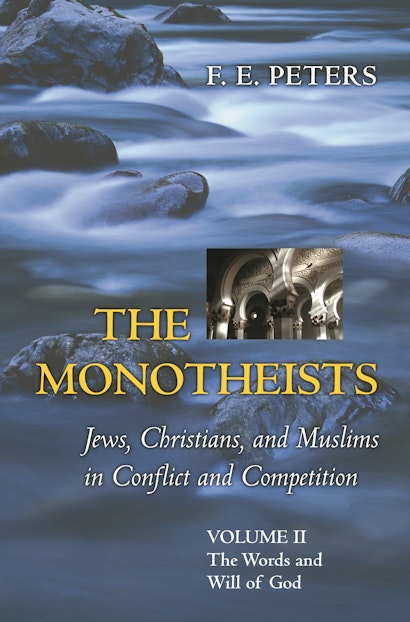The world’s three great monotheistic religions have spent most of their historical careers in conflict or competition with each other. And yet in fact they sprung from the same spiritual roots and have been nurtured in the same historical soil. This book—an extraordinarily comprehensive and approachable comparative introduction to these religions—seeks not so much to demonstrate the truth of this thesis as to illustrate it. Frank Peters, one of the world’s foremost experts on the monotheistic faiths, takes Judaism, Christianity, and Islam, and after briefly tracing the roots of each, places them side by side to show both their similarities and their differences.
Volume I, The Peoples of God, tells the story of the foundation and formation of the three monotheistic communities, of their visible, historical presence. Volume II, The Words and Will of God, is devoted to their inner life, the spirit that animates and regulates them.
Peters takes us to where these religions live: their scriptures, laws, institutions, and intentions; how each seeks to worship God and achieve salvation; and how they deal with their own (orthodox and heterodox) and with others (the goyim, the pagans, the infidels). Throughout, he measures—but never judges—one religion against the other. The prose is supple, the method rigorous. This is a remarkably cohesive, informative, and accessible narrative reflecting a lifetime of study by a single recognized authority in all three fields.
The Monotheists is a magisterial comparison, for students and general readers as well as scholars, of the parties to one of the most troubling issues of today—the fierce, sometimes productive and often destructive, competition among the world’s monotheists, the siblings called Jews, Christians, and Muslims.
Awards and Recognition
- Winner of the 2003 Award for Best Professional/Scholarly Book in Religion, Association of American Publishers
- One of Choice's Outstanding Academic Titles for 2004
"[A] titanic undertaking. . . . The Monotheists is not exceptional for [its] detachment alone, or for its erudition, or even for its originality. It is exceptional because Peters has created a new genre for it."—Jack Miles, Los Angeles Times
"Historian Peters has long been an astute and objective chronicler of the history and beliefs of the three great monotheistic religions—Judaism, Christianity and Islam. In this sprawling, majestic and elegant narrative, he offers the best study we presently have of the ways, words and wisdom of these religions [with] straightforward prose and evenhanded examination. . . Peters's magnificent book is the new place to turn for a first-rate historical introduction to these three religions."—Publishers Weekly
"There is no more informative, accessible and comprehensive guide to the beliefs and practices of the three great monotheistic religions than these two volumes. . . . Peters has a great story to tell, and he tells it very well. He writes with extraordinary clarity and evenhandedness. . . . He treats thousands of complex and sensitive topics with meticulous learning without offending or proselytizing. Moreover, he manages to keep the three narratives—Judaism, Christianity and Islam—going at once, and allows readers both to appreciate the distinctive character of each and to see how their stories have very frequently intertwined."—Daniel J. Harrington, America
"Peters has done it again. With these two volumes he has created an excellent and timely resource for understanding the similarities and differences between the three monotheistic traditions of the West."—Choice
"Goethe said: 'As students of nature we are pantheists, as poets polytheists, as moral beings monotheists.' F. E. Peters's The Monotheists gives a keener edge to Goethe's irony, and he teaches us again the 'conflict and competition' between Jews, Christians, and Muslims. Throughout his career, Peters has been our most comprehensive scholar of the agon waged by the three camps with one another. In The Monotheists he achieves the apotheosis of his enterprise, defining precisely this 'fractious family' in all its contours. The perpetual relevance of Peters's lifelong subject is heightened at our moment in history."—Harold Bloom, author of The Western Canon: The Books and School of the Ages
"A work of breathtaking scope! Many scholars write about Judaism and Christianity, or Judaism and Islam, or Islam and Christianity, but only F. E. Peters has the learning, adventurousness, and historical imagination to take on all three religions in relation to one another within the scope of one book. Written in a clear expository prose, these volumes will be an invaluable resource for students and teachers, diplomats and statesmen, journalists and pundits on the vexing religious topics that today seem an inevitable part of political life and social discourse."—Robert Louis Wilken, author of The Spirit of Early Christian Thought
"F. E. Peters has written a magisterial account of the family similarities and quarrels through the centuries of the three biblical religions, Judaism, Christianity, and Islam. In these two volumes, he is at once, as always, vastly learned and at the top of his form as an entertaining and persuasive writer. This work will immediately take its place as the standard account of the Hebrew Bible and its reflection in the Talmud, the New Testament, and the Koran."—Arthur Hertzberg, author of Jews: The Essence and Character of a People
"An authoritative introduction to the study of Judaism, Christianity, and Islam, The Monothesists will be especially useful for students in religious studies courses. To the initiates it offers an impressive original synthesis of the material and a challenging reading of important chapters in religious history. Written in clear, fluent prose, the book is never verbose, and its underlying structure is easy to follow."—Sarah Stroumsa, The Hebrew University of Jerusalem, author of Freethinkers of Medieval Islam
"The Monotheists is a splendid work. It will be valuable as a classroom text on the three 'Western' monotheistic religious traditions, and it will also appeal to more general readers who seek to investigate the historical background to the present events in the Middle East. Previous such comparative studies are flawed by comparison."—Richard C. Martin, Emory University, author of Defenders of Reason in Islam


